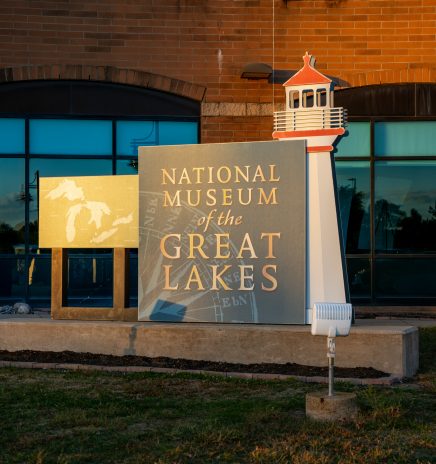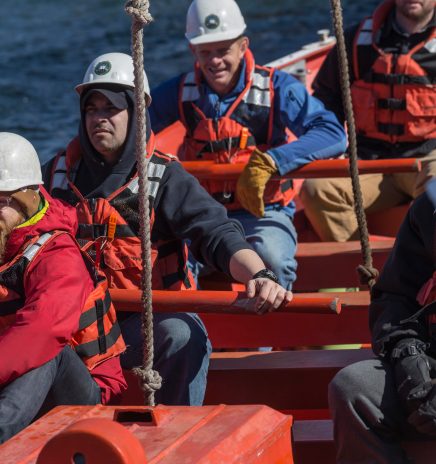Acknowledging Veterans: New Great Lakes Maritime Academy Program Accepts Sea Hours From Service
The website for the U.S. Committee on the Marine Transportation System says one reason for simplifying the ability for military veterans to transfer their expertise to the U.S. Merchant Marine is, “Military sea-service veterans have specialized training and experience needed by the United States Merchant Marine. Facilitating the transfer from military service to merchant mariner increases the number of qualified mariners needed to support our economy and national defense.”
In the U.S. we are fortunate to have six state maritime academies as well as the U.S. Merchant Marine Academy. These federally regulated maritime academies offer an outstanding path for an individual who is interested in a career in the U.S. maritime industry. A person can enter an academy with no seagoing experience, and within four years, he or she will earn both a bachelor’s degree and an unlimited horsepower U.S. Coast Guard engine license or an unlimited tonnage deck officer license. At Northwestern Michigan College’s Great Lakes Maritime Academy (GLMA), the deck cadets also earn Great Lakes Pilotage.
Currently, there is a strong demand for graduates of the academy. Many cadets can sail on their license immediately upon graduation.
New Program Benefits Vets
There is a particularly strong demand for graduates of the academy’s engineering officer program. To increase interest in our engineering officer program and facilitate the ability of military veterans to serve in the U.S. Merchant Marine, GLMA developed its Military Veteran Engineering Training (MVET) program.
The academy developed the MVET program due to the inability of student-veterans, many of whom have accrued substantial sea time while on active duty, to apply their military sea service toward the sea service requirements contained in the academy’s Coast Guard approved program. These requirements include earning the equivalent of 360 sea days while being enrolled as a cadet. The student-veterans were unable to apply their sea service due to the federal regulations the academy falls under.
An additional challenge these student-veterans faced was that the length of the academy’s program exceeded the length of time a veteran receives GI Bill educational benefits. The length of the GLMA program is due to the requirement to complete three sea projects as well as eight academic semesters. The most common concern voiced by the academy’s student-veterans is that their GI Bill benefits do not cover the full cost of the academy’s program. The curriculum at GLMA can take up to 44 months to complete, and the benefits provided by the GI Bill expire after 36 months.
Our discussions with the U.S. Coast Guard regarding the development of this program began in 2016, with a draft being submitted in 2017. The discussions were always positive, but because the program was more complex than we initially envisioned, it was not approved until this year. The complexity was due to the need to ensure our MVET program met the standards of our accredited bachelor’s degree and federal regulations, as well as the International Convention on Standards of Training, Certification, and Watchkeeping for Seafarers (STCW Code). Of course, the pandemic also impacted our ability to work on the submission.
I am pleased to note that, thanks to an incredible amount of effort on the part of the faculty and staff at GLMA, numerous individuals at both Coast Guard Headquarters and the Coast Guards National Maritime Center, coupled with everyone’s refusal to take no for an answer, the GLMA MVET program was officially approved on Sept. 23, 2021. That evening, Capt. Bradley Clare, commanding officer of the National Maritime Center formally signed the approval letter at the annual convention of the American Merchant Marine Veterans. Capt. Clare stated, “I am excited to approve this program at Great Lakes Maritime Academy, which greatly supports providing a pathway for transitioning military members to integrate into the maritime industry. The National Maritime Center is very committed to ensuring the success of our transitioning military members.”
While the means to facilitate the ability of veterans to transition into the U.S. Merchant Marine, increasing interest in the academy’s engineering program and allowing a veteran to complete our program before their GI Bill benefits expire are important, there was another reason why the academy was committed to the development of this program. It was a common statement we hear from our student-veterans; after honorably serving their nation, they simply wanted to receive credit for what they gave. We are proud to state that we can now give them that credit.

From History Keepers to Industry Builders at the National Museum of the Great Lakes
At the National Museum of the Great Lakes, our mission is to preserve, share and celebrate the past, present and future of the Great Lakes story. That story is vast,... Read More

Building a Framework To Address Workforce Shortages
The United States Merchant Marine is at a crossroads – one that could define the future of our maritime sector for generations. As workforce shortages collide with increased global competition,... Read More

